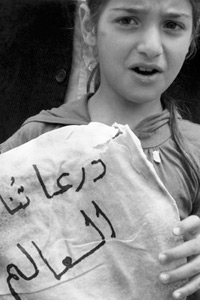Deutsch
Ein syrisches Mädchen hält ein Stück Brot in die Kamera, dessen Aufschrift die Welt um Hilfe für Daraa bittet. Anfang Mai wurden aus der syrischen Stadt Verhaftungen und Raketenbeschuss durch das syrische Militär gemeldet. Seit Mitte März sollen allein in der Protesthochburg Daraa über 800 Menschen verhaftet worden sein. Im ganzen Land zählten Menschenrechtler mindestens 560 tote Demonstranten.
Die arabische Jugend, die während der revolutionären politischen Umbrüche ihre Hoffnungen auf die intellektuelle arabische Elite setzte, kritisiert zunehmend deren Zurückhaltung und Schweigen in Bezug auf die politischen Regimes. Ihre Wut richtet sich auf die ältere Generation von Dichtern, Schriftstellern, Künstlern und Akademikern, denen sie Duckmäuserei und Anbiederung bei den Machthabern vorwerfen.
Statement
Die Spannung dieses Liedes erwächst aus den zwei Nachrichten, die ihm zugrunde liegen: die Hoffnung auf Hilfe, die das Foto des Mädchens aus Daraa ausdrückt, und die Enttäuschung der arabischen Jugend über das Schweigen ihrer intellektuellen Elite zu den politischen Revolutionen – ihre fehlende kritische Auseinandersetzung mit den überkommenen Herrschaftssystemen.
Meine Reaktion auf diese Nachrichten ist die Vertonung eines Gedichts des berühmten syrisch-libanesischen Dichters Adonis, einem der Intellektuellen der älteren Generation, dem ebenfalls ein Mangel an klarer Positionierung zugunsten der Protestierenden vorgeworfen wird. In diesem Gedicht beschreibt Adonis ebendieses Thema: die Notwendigkeit einer Umwälzung. Das Lied ist damit gleichzeitig eine Antwort auf die Erwartungen der jungen Generation und selbst eine Frage: Kann ein Werk für eine Person einstehen, oder ist eine Person vielmehr auch ihrem Werk verpflichtet?
Spiegel der Erde
Der mich in meinem Bett bedrängt
Der Palmen ausreißt, Kuppelgräber und Glocken
Der die Erde ohrfeigt –
Dieses störrische Blut, diese Verweigerung
Ist ein andres Sehnen, ein Entflammen
Im Namen des Morgens, der im Namen der Erde kommt –
Das Königreich der Geschichte, der Gegenwart und der Hochzeiten
Ist ein anderes Sehnen, ein Entflammen
Der siegreichen Zeit, deren Hände
Wie meine sind, voll mit Lehm und dem Licht der Erde.
Adonis
English
A Syrian girl points a piece of bread inscribed with an appeal for help from Daraa to the world at the camera. At the beginning of May, arrests and missile strikes by the Syrian military were reported in the city. Since mid-March over 800 people are said to have been arrested in Daraa — one of the main centres of the protests — alone. Human rights activists calculate that at least 560 protesters have been killed throughout the entire country.
The Arabian youth, who placed their hopes in the intellectual Arabian elite during these revolutionary political upheavals, are increasingly critizising the elite’s reluctance to act and its silence towards the regimes. Youth anger is directed against the older generation of poets, authors, artists and academics, whom they accuse of moral cowardice and sycophancy.
Statement
The tension of this song arises from the two pieces of news underlying it: the hope for help expressed by the picture of the girl in Daraa, and the disappointment of the Arabian youth over the silence of their intellectual elite regarding the political revolutions — their lack of critical confrontation with the traditional systems of rule. My reaction to these messages is to set to music a poem by the famous Syrian-Lebanese poet Adonis, an intellectual of the older generation, who is likewise accused of not taking a clear position on the side of the protesters. In the poem, Adonis describes just this theme: the necessity of an upheaval. Therefore the song is simultaneously an answer to the expectations of the younger generation and a question in itself: can a work of art advocate for a person, or is a person instead committed to the message of his own work?
Mirror of Earth
That which harasses me in my bed
Which uproots palm trees, qubba tombs and bells
Which belts the earth —
This stubborn blood, this refusal
Is another kind of longing, an ignition
In the name of the morning, which arrives in the name of the earth —
The kingdom of history, of the present and of times of celebration
Is another kind of longing, an ignition
Of a victorious time, whose hands
Are as mine, full of clay and the light of the earth.
Adonis
Quellen / sources: Al-Quds al-Arabi volume 23, issue 6808, 3. 5. 2011, S. / p. 5., Neue Zürcher Zeitung, Nr. 102, 3. 5. 2011, S. / p. 20., de.euronews.net daylife.com (Letzter Zugriff / last access: 10. 5. 2011)
